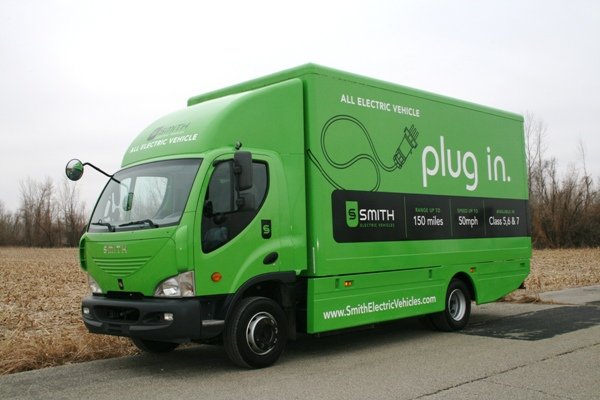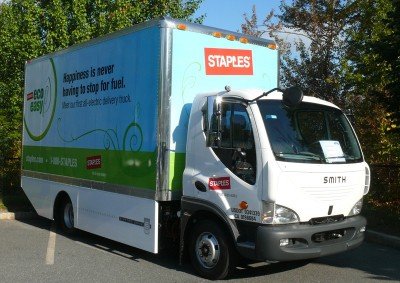 UK data provider finds little interest in EVs among fleet owners
UK data provider finds little interest in EVs among fleet owners
mib Data Solutions of Leamington Spa UK says only 18 of 100 fleets have plans to incorporate electric vehicles (EVs) into their fleets in the next two years. Reasons cited included those mentioned by consumers – too little range and too little infrastructure. Which goes to show you that there is a huge education opportunity ahead, and those that move to fill that education gap will be the winners. Why do we say this? Read on.
Staples, one of the largest delivery fleet operators in the United States, went electric in 2009. Prior to this, all trucks in the Staples fleet had been diesel engine trucks.
In 2010 Staples plans included adding 41 more all electric trucks to their fleet of 2,000 trucks in operation nationwide. In order to increase fuel economy, all trucks were governed at 55 mph (which likely did not please the drivers) to reduce fuel consumption, thereby saving money and reducing emissions. One big draw to going electric – cost of operation was dramatically reduced. Cost of fuel alone (not counting maintenance savings) dropped from over $0.40 per mile to $0.12 per mile – a 70% cost reduction. In real numbers this means that one truck with a daily 60 mile route would travel 15,000 miles per year (60 miles per day times 5 days per week times 50 weeks per year). This one truck would provide cost savings of $4,200 per year, or $42,000 over ten years. In the past ten years, the cost of gasoline has doubled while the cost of electricity rose 47%. During that same time frame the cost of diesel fuel tripled from $1.00 per gallon to $3.00 per gallon. Based on historical price action, it would be reasonable to expect increased cost efficiencies into the future providing for greater savings vs. a traditional diesel powered truck.
One might look at these numbers and observe that 41 trucks out of 2,000 makes little difference. Or one might look at these numbers and say that in the right application, an electric vehicle makes great sense. We have said this all along, and will continue to say it – use the right tool for the right job. An EV is a tool that is not right for every job. But for the right job it is a very good tool.
What does all of this have to do with aspiring or current LEAF owners? Everything. Today I filled up the tank of my company car – a four cylinder Nissan Altima. I drive the car how I think many four door family sedan owners will drive their cars. My average fuel economy over the past 2600 miles or so is right around 29 miles per gallon according to the cars trip computer, which I have not reset since picking up the car. Today’s fill-up cost $70.16 for 18.886 gallons of regular gasoline at $3.879 per gallon in San Diego. So that gasoline probably moved me about 547 miles down the road. Last month we drove our LEAF between 500 and 600 miles (we will keep better records this month). Let’s say it was only 500 miles. It cost $18 in electricity. So for vehicles driven similarly, the LEAF cost $0.036 per mile and the Altima cost $0.128 per mile in fuel costs. This equates to a 72% reduction in fuel cost (versus a car that gets 29 miles per gallon). Compared to our previous primary vehicle (a 2004 Nissan Quest) which averaged less than 20 miles per gallon around town the cost savings would be even more dramatic.
Not all fleet owners will benefit by using EVs in their fleet. Not all fleets offer the right opportunity to use EVs. But for those that do, there are many attractive benefits to electric vehicle ownership and operation.

